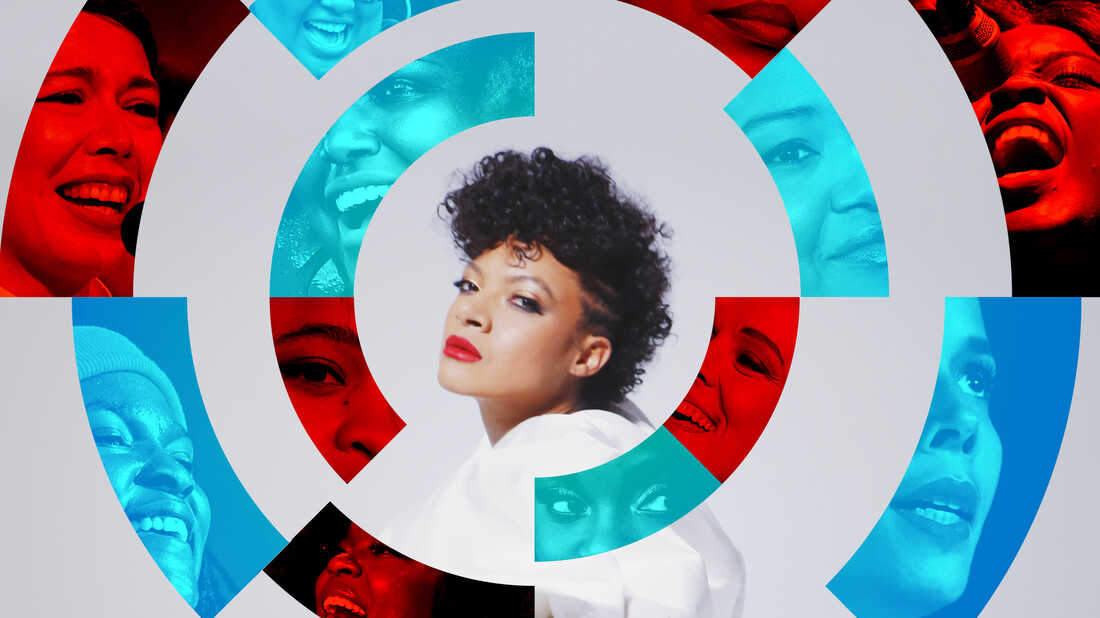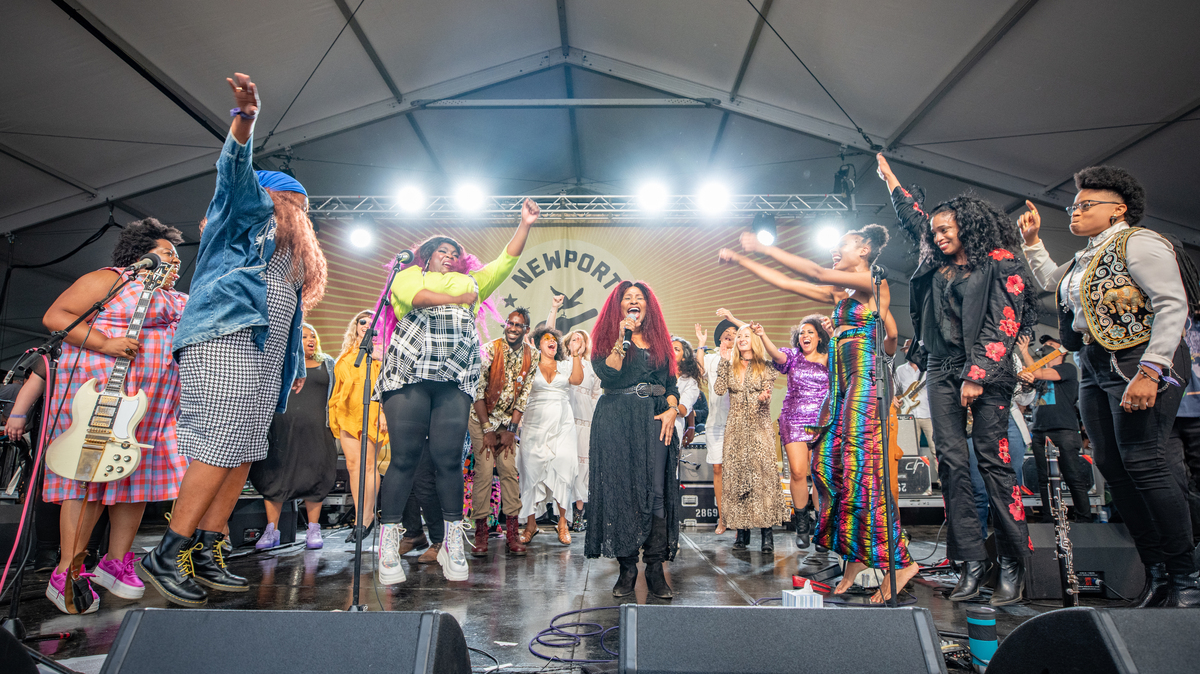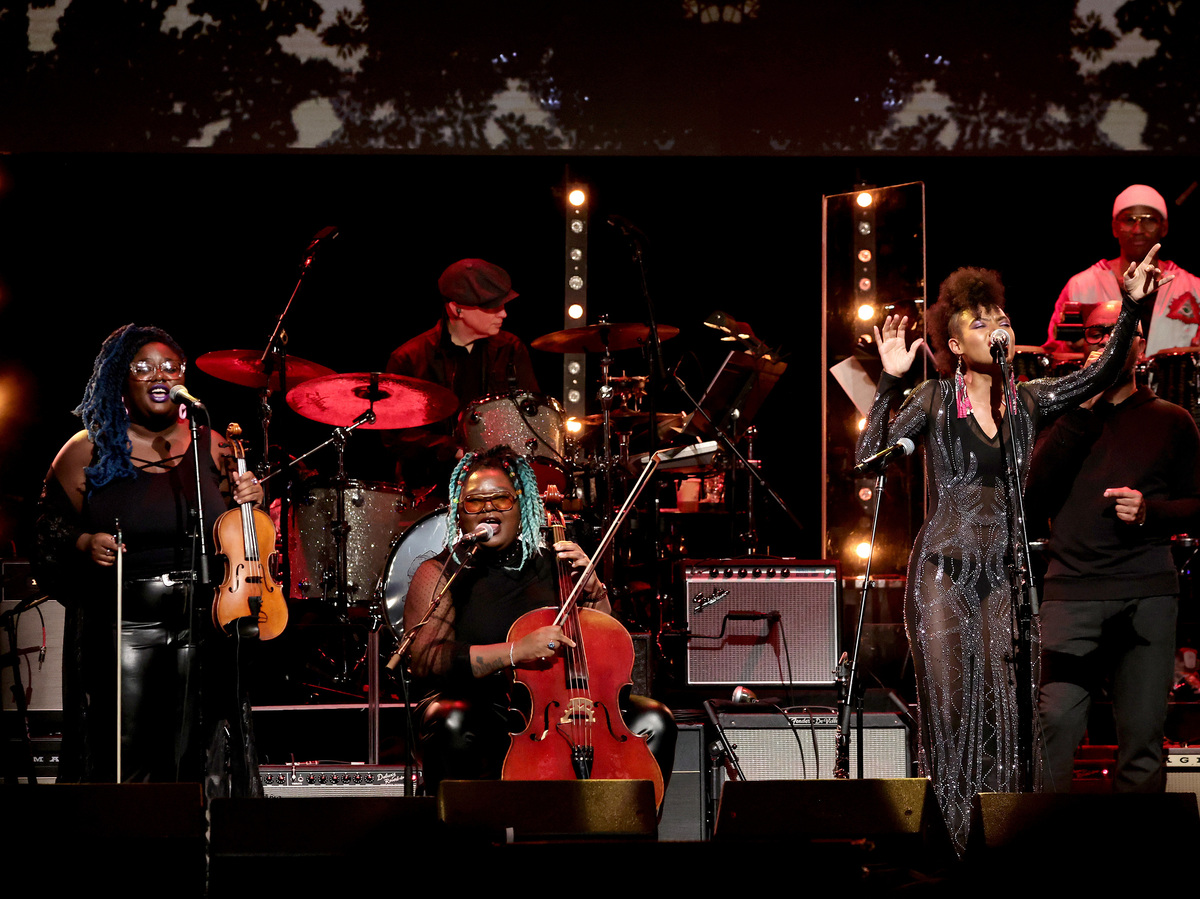Along with her final album, the veteran musician broke by means of Americana’s boundaries. Now she’s attempting to ensure the door stays open

Collage by Jackie Lay.
Erika Goldring / Frazer Harrison / Kevork Djansezian / Stefani Reynolds / Jason Kempin / Tom Cooper / Terry Wyatt / Alberto E. Rodriguez/Getty Photos
disguise caption
toggle caption
Erika Goldring / Frazer Harrison / Kevork Djansezian / Stefani Reynolds / Jason Kempin / Tom Cooper / Terry Wyatt / Alberto E. Rodriguez/Getty Photos

Collage by Jackie Lay.
Erika Goldring / Frazer Harrison / Kevork Djansezian / Stefani Reynolds / Jason Kempin / Tom Cooper / Terry Wyatt / Alberto E. Rodriguez/Getty Photos
2021 was not, technically, the primary 12 months Allison Russell performed the Newport People Competition. Russell had beforehand taken the stage at what’s lengthy been a honored showcase of bearers and updaters of custom along with her bands Birds of Chicago and Our Native Daughters, however by no means earlier than as a solo artist. And by no means with as vibrant a highlight because the one which adopted the discharge of her album Outdoors Little one. That was her first work underneath her personal identify, and it compelled critics and followers to treat her in a brand new gentle, as a visionary artist telling a story that solely she may: of how white supremacist, familial trauma might need finished her in, if she hadn’t customary her personal imaginative liberation.
Russell’s solo arrival earned her delight of place at Newport: the chief of the pageant’s culminating celebration, its Sunday night time “superjam.” However quite than basking within the highlight she’d secured for herself, Russell took the chance to behave as an organizer, inviting an array of roots-savvy musical friends, all Black ladies — Adia Victoria, Kam Franklin, Yola, Amythyst Kiah, Sunny Struggle, Pleasure Oldokun and Celisse amongst them — to hitch her. Monique Ross, a cellist who first performed alongside Russell on that stage, nonetheless seems to be again and marvels. “It was like nothing I’ve ever skilled, not just for being folks of colour, however ladies of colour,” Ross says. “She was very intentional with that. Once you go to music festivals, that is not what you normally see.”
As the following two years would show, Russell was intent on complicating the general public’s notion of her rising star, and Newport was solely part one. She went in regards to the process with a deeply held sense of function: to transcend the traditionally gendered and racialized musical fashions she discovered limiting.
As scholar Jack Hamilton illustrates in Simply Round Midnight: Rock and Roll and the Racial Creativeness, with the rise of the white, male rock genius within the ’60s, towering worth got here to be positioned on particular person authorship and creative daring that was acknowledged solely specifically sorts of performers, a worth system that is endured in well-liked music. “The popularity of white folks as people whereas recognizing nonwhite folks solely in relation to collectives is a trademark of racism throughout all areas of tradition,” Hamilton writes. Seeing a gap, Russell was decided to undermine that binary.
Her most beautiful subversion lies in how she’s come to embody a critique and revision of 21st century creative brilliance, proving that her magnetic voice registers most potently as she orchestrates genuinely communal creativity. “It isn’t about one particular person having a second,” she affirms in her East Nashville front room, as her canine pouts on the couch, awaiting a stroll. “It is in regards to the energy of the circle rising and rising and rising, and together with increasingly and extra folks inside that.”
She’d felt the aesthetic boundaries erected round white definitions of roots music, guidelines enforced particularly “tyrannically” within the abusive family of her youth the place classical music held sway (as in, “I wasn’t allowed to take heed to something written after 1895,” she says). And Russell noticed a manner of releasing herself and her collaborators from the onerous burdens positioned on performers of colour, who’re anticipated to affirm the authenticity of their output inside these confines.
When she titled that Newport superjam “As soon as and Future Sounds,” she was sketching out a template expansive sufficient to encapsulate each historic excavation and Black musical innovation. All the time fast to acknowledge that she stands on the shoulders of unsung predecessors, significantly Black banjo gamers, who appeared like her, she’s additionally let herself be drawn ahead, towards the electronically enhanced dance ground explorations of the disco period and past, music usually seen as suspect and artificial by roots requirements.

In 2021, following the discharge of her breakthrough album Outdoors Little one, Allison Russell (seen right here in rainbow jumpsuit, along with her arms outstretched) organized the Newport People Competition’s “superjam” that includes Chaka Kahn (at middle) in addition to Brandi Carlile, Pleasure Oladokum, Yola, Nathaniel Rateliff, Margo Worth, Adia Victoria and others.
Douglas Mason/Getty Photos
disguise caption
toggle caption
Douglas Mason/Getty Photos

In 2021, following the discharge of her breakthrough album Outdoors Little one, Allison Russell (seen right here in rainbow jumpsuit, along with her arms outstretched) organized the Newport People Competition’s “superjam” that includes Chaka Kahn (at middle) in addition to Brandi Carlile, Pleasure Oladokum, Yola, Nathaniel Rateliff, Margo Worth, Adia Victoria and others.
Douglas Mason/Getty Photos
Chaka Khan was the musical elder available to consecrate the superjam by doing a few her modern, cosmopolitan late ’70s and early ’80s hits, “I am Each Lady” and “Ain’t No one.” Throughout her, two or three to a mic, the youthful performers shaped an exuberant refrain. Russell, rocking an iridescent rainbow jumpsuit, jumped round and pumped her arms within the air. “These songs have been as a lot roots canon as ‘Goodnight Irene’ or ‘4 Sturdy Winds’ or ‘Will the Circle Be Unbroken’ or any of the issues that everyone is aware of each phrase to,” says Russell. “These songs did that very same work at Newport. It was a bunch sing.” She recollects realizing then “that we may play that music with abandon,” and wished to carry onto that feeling, and finally, see what she may do with it when she made what would grow to be her newly launched second album, The Returner.
The Allison Russell recognized to avid folkies for the higher a part of the final twenty years had been a consummate collaborator who made beneficiant and distinctive contributions to a succession of bands. Her sinuous melodies and feathery vibrato warmed nearly the whole lot they touched within the countrified jazz combo Po’ Woman, in Birds of Chicago, her soulful, shape-shifting folk-rock duo with husband J.T Nero, and the transient however necessary all-Black string band Our Native Daughters, convened by Rhiannon Giddens. All the time, Russell’s artistic ambition got here with a way of duty. “I did not need to have unrealistic expectations of what was doable,” she explains. “I used to be simply attempting to indicate up as bravely and authentically as I may with every alternative that appeared.”
Russell had watched, and benefited from, how a few different artists in her realm used their platforms: how Giddens grew to become the mannequin of scholarly virtuosity and solidarity; how Brandi Carlile turned her gallant basic rock confessionalism towards advocacy.
After purchasing Outdoors Little one round a bit and receiving belittling responses from labels, Russell tentatively DMed Carlile, whose personal long-simmering success had lately exploded, in 2020. Carlile wrote again, rhapsodizing about Russell’s music cycle and providing to make trade introductions. For Russell, “That was the primary shock of a recognition of, ‘Oh, this can be a very totally different expertise,’ to be championed like that by one other artist who’s been within the trenches so long as I’ve, however who the doorways opened for earlier. That was so transformative for our household, and clearly for the report, as a result of then it received to the those that did worth it.”
Russell launched her album on the reactivated Fantasy Information, initially performing the fabric with those that’d helped her report it, Nero and producer Dan Knobler amongst them. Pretty shortly, although, these white, male collaborators disappeared from her reside lineup. “I am keen on all the males that I’ve performed music with through the years,” says Russell, “however I not felt that I wanted to middle that presentation for what I am rising as a touring artist.”
She and Nero, who she calls “the particular person and artist I belief most on the planet,” and with whom she has a daughter, Ida, reached a brand new association. Now they pursue separate, however generally overlapping initiatives, Nero merging natural and digital parts within the duo Dim Star together with his brother Drew Lindsay. Nero and Russell take turns touring and staying residence with their child.

Chauntee Ross (left, with violin) and Monique Ross (middle, with cello) of SistaStrings carry out with Allison Russell in New York Metropolis in March 2022. The duo now performs as a part of Brandi Carlile’s band, and is nominated for the instrumentalist of the 12 months award on the 2023 Americana Music Affiliation Awards.
Jamie McCarthy/Getty Photos
disguise caption
toggle caption
Jamie McCarthy/Getty Photos

Chauntee Ross (left, with violin) and Monique Ross (middle, with cello) of SistaStrings carry out with Allison Russell in New York Metropolis in March 2022. The duo now performs as a part of Brandi Carlile’s band, and is nominated for the instrumentalist of the 12 months award on the 2023 Americana Music Affiliation Awards.
Jamie McCarthy/Getty Photos
One after the other, Russell assembled round her completed musicians who’re additionally ladies, or folks of colour, or queer, or gender expansive, at numerous occasions together with guitarists Pleasure Clark, Megan McCormick and Mandy Fer, bassist Ganessa James, drummers Megan Coleman and Elizabeth Goodfellow, percussionist Eliabeth Pupo-Walker, string gamers Larissa Maestro and Monique and Chauntee Ross — the latter two often known as Sista Strings — and others moreover. “I felt known as to middle intersectional identities inside my band,” Russell explains, “as a result of if I am not going to actively do this work, how can I ask someone else to do it?”
By the point she took the stage final September on the 2022 Americana Music Honors & Awards, because the recipient of the album of the 12 months plaque, she’d dubbed the ever-evolving group the Rainbow Coalition. The identify suggests a political alliance between equals greater than a backing band. “Coalition,” Russell clarifies, “is as a result of persons are engaged on their very own issues. They’re composers and producers and recording artists, they’re lead singers and multi-instrumentalists.” The message landed; Maestro was named instrumentalist of the 12 months that night time, and Sista Strings is nominated in the identical class in 2023. At this week’s awards present, Russell herself will likely be up for a marquee award: artist of the 12 months.
Over the past couple of years, Russell welcomed her musical comrades to take liberties in deciphering her materials, to improvise in additional rhythmically supple, undulating and ecstatic instructions. “I’ve by no means been excited about style segregation or within the limiting of artwork,” she says. “However I feel as a result of I used to be usually not attending to tour with percussionists, due to price range or this or that, attending to tour with a bigger ensemble, even when it meant going into some debt, has been price it to me, as a result of there’s sonic locations that we get to go collectively.”
Monique Ross observes, “I actually loved seeing [the songs from Outside Child] evolve into one thing else, despite the fact that it is such a private story that Alison’s telling. It simply speaks to the facility of sharing and therapeutic that we may all participate in it.”
Chauntee Ross recollects tv appearances the place producers mechanically positioned Russell out entrance and everybody else within the Rainbow Coalition within the background. In these conditions, Russell selected heat resistance, requesting that the gamers be moved as much as type a semicircle alongside her. “I like seeing her go into these areas and rearranging how everybody thinks that it’ll go,” says Chauntee Ross, she and her sister talking on Zoom from their shared resort room earlier than a soundcheck on their first stadium tour. They’re now in Carlile’s band, opening for pop famous person Pink.
Sista Strings aren’t the one ones for whom enjoying with Russell shortly functioned as a springboard to larger gigs. Different artists may resent such departures as disloyalty, however Russell celebrates her collaborators’ alternatives. Within the midst of our interview, she goes by means of a roll name of kinds, taking care to say the contributions and accomplishments of everybody in her orbit. A lot of them, she emphasizes, helped her pull collectively the multi-artist, Nashville area fundraiser Love Rising final March, mere weeks after the state of Tennessee handed laws focusing on drag exhibits and transgender healthcare. A model of the Rainbow Coalition, made up of the musicians who have been accessible, served as the home band.

In March, Russell (at middle, with microphone) organized a profit live performance aimed toward combating payments in Tennessee that focused drag exhibits and transgender healthcare. Different performers on the stage on the Bridgestone Enviornment present included Jason Isbell, Maren Morris, Pleasure Oladokun and Amanda Shires.
Jason Kempin/Getty Photos
disguise caption
toggle caption
Jason Kempin/Getty Photos
To report her follow-up to Outdoors Little one late final 12 months, Russell scheduled studio time in L.A. throughout the one window when all the Rainbow Coalition, even members who’d moved on from touring with Russell, and her co-producers in Dim Star, Nero and Lindsay, may all assemble in a single place. The forebears that Russell wished to work with have been Wendy Mevoin and Lisa Coleman, well-known for his or her landmark funk-pop experimentation with Prince and the Revolution and their very own duo Wendy & Lisa.
To organize for the periods, Russell engaged in one thing like a recent pop songwriting course of, requesting drum loops and synth pads from Dim Star that matched the irrepressible temper of her ruminations. She introduced songs that spoke to the area they’ve all created away from the ugliness of dehumanizing forces on the planet, with lyrics that exulted in her artistic energy (“Shadowlands”: “I can deliver the cool rain once I need to/I understand how to collect the clouds”), scoffed on the world’s concern of Black ladies utilizing their company (“Eve Was Black”) and mocked any try and maintain oppressive agendas hidden from her and fellow seers (“Demons”).
This time, Russell requested everybody to sing along with her, not in muted, measured tones, however vigorous, jubilant and unfettered, someplace between gospel choir, lady group and gang vocals. After some convincing, Melvoin and Coleman even joined her in a unison, rap-like chanted passage throughout “All With out Inside,” whose self-confident and sensual swagger feels extra Prince-inspired than the rest Russell has finished. On the finish of that observe, her collaborators will be heard laughing heartily, exclaiming in pleasure, egging one another and Russell on.
By the point the album is over, they’ve rendered the whole lot from down-home blues to dramatically hurtling disco string passages and propulsive, danceable grooves punctuated by true breakdowns with a generally sly, usually effervescent and all the time freewheeling and sisterly chemistry. It sounds and feels totally different from the rest Russell’s recorded. She will level to an array of cutting-edge and aware reference factors that helped her get there, however above all, she says, “It is the work of my circle, our circle, collectively.”



